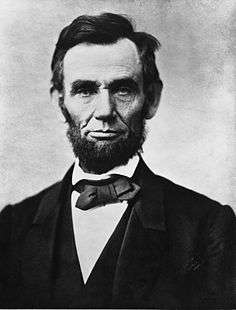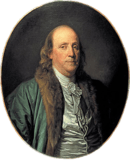The Greatest American
The Greatest American was a four-part American television series hosted by Matt Lauer in 2005. The show featured biographies and lists of influential persons in U.S. history, and culminated in a contest in which millions in the audience nominated and voted for the person they felt was the "greatest American". The four-part competition was conducted by AOL and the Discovery Channel and reported on by the BBC.[1]
| The Great Americans | |
|---|---|
| Presented by | Matt Lauer |
| Country of origin | United States |
| Production | |
| Executive producer(s) | Jason Raff |
| Release | |
| Original network | Discovery Channel |
| Original release | 5 June 2005 |
President Ronald Reagan achieved the highest position. His son, Ronald Reagan Jr., commented to the network that "I'm sure he would be very honored to be in the company of these great gentlemen." In total, the American public cast over 2.4 million votes during the nomination process.[2]
In detail, Martin Luther King, Jr. was the highest ranked person of color, at number three, while Oprah Winfrey, at number nine, was the highest ranked woman. George W. Bush, at number six, had the highest status of any living American; all five figures at the top of the tally were deceased at the time of the voting.
Nominations
Nominations were accepted through 31 January 2005. The seven-hour-long series was broken into four episodes: The first episode counted down the top 100 and introduced the top 25 nominees in alphabetical order. The second episode featured biographies of the top 25 nominees as well as commentaries from influential people such as celebrities and politicians. The third episode, called "The Great Debate", introduced the top five nominees and pitted the studio audience supporters of each of the nominees and a person selected to represent each of the top five candidates against a panel of three celebrities. In the finale the top five "Greatest Americans" were announced as well as what percentage of the votes each had received. Votes were taken through a toll free (if calling from a land line) phone number, through text messages from cellphones, and through online voting. Voters were allowed to vote three times per voting method, so anyone had a chance of voting at least nine times.
Top Twenty-five


16th President of the United States (1861–65).

.jpg)
1st President of the United States (1789–97).

author, inventor, statesman, and scientist.
- Ronald Reagan, (1911–2004) actor and 40th President
- Abraham Lincoln, (1809–1865) 16th President
- Martin Luther King Jr., (1929–1968) minister and civil rights leader
- George Washington, (1732–1799) general and 1st President
- Benjamin Franklin, (1705–1790) author, printer, scientist and politician
- George W. Bush, (1946–) 43rd President
- Bill Clinton, (1946–) 42nd President
- Elvis Presley, (1935–1977) musician and actor
- Oprah Winfrey, (1954–) talk show host and actress
- Franklin D. Roosevelt, (1882–1945) 32nd President
- Billy Graham, (1918–2018) minister
- Thomas Jefferson, (1743–1826) writer and 3rd President
- Walt Disney, (1901–1966) animator and film producer
- Albert Einstein, (1879–1955) physicist
- Thomas Alva Edison, (1874–1931) inventor
- John F. Kennedy, (1917–1963) 35th President
- Bob Hope, (1903–2003) actor and comedian
- Bill Gates, (1955–) businessman
- Eleanor Roosevelt, (1884–1962) First Lady, activist and diplomat
- Lance Armstrong, (1971–) cyclist
- Muhammad Ali, (1942–2016) boxer
- Rosa Parks, (1913–2005) civil rights activist
- The Wright Brothers, inventors and aviation pioneers
- Henry Ford, (1863–1947) industrialist and businessman
- Neil Armstrong, (1930–2012) astronaut
Alphabetical list
On 18 April 2005, AOL and The Discovery Channel announced the top 100 nominees.
The remaining 75 nominees:
- Maya Angelou, (1928–2014) poet and writer
- Susan B. Anthony, (1820–1904) women's rights activist
- Lucille Ball, (1911–1989) actress and comedian
- Alexander Graham Bell, (1847–1922) inventor and scientist
- Barbara Bush, (1925–2018) First Lady
- George H. W. Bush, (1924–2018) 41st President
- Laura Bush, (1946–) First Lady
- Andrew Carnegie, (1835–1919) industrialist and philanthropist
- Johnny Carson, (1925–2005) comedian and talk show host
- Jimmy Carter, (1924–) 39th President
- George Washington Carver, (1860s–1943) botanist and inventor
- Ray Charles, (1930–2005) musician
- César Chávez, (1927–1993) labor leader and activist
- Hillary Clinton, (1947–) politician
- Bill Cosby, (1937–) comedian
- Tom Cruise, (1962–) actor
- Ellen DeGeneres, (1958–) comedian and talk show host
- Frederick Douglass, (1818–1895) writer and abolitionist
- Amelia Earhart, (1897–1937) aviator
- Clint Eastwood, (1930–) actor and film director
- John Edwards, (1953–) politician
- Dwight D. Eisenhower, (1890–1969) general and 34th President
- Brett Favre, (1969–) football player
- Mel Gibson, (1956–) actor and film director
- Rudolph Giuliani, (1944–) politician
- John Glenn, (1921–2016) astronaut and politician
- Alexander Hamilton, (1757–1804) statesman and 1st Secretary of the Treasury
- Tom Hanks, (1956–) actor
- Hugh Hefner, (1926–2017) magazine publisher
- Katharine Hepburn, (1907–2003) actress
- Howard Hughes, (1907–1979) businessman, film producer and aviator
- Michael Jackson, (1958–2009) musician
- Steve Jobs, (1955–2011) businessman and inventor
- Lyndon B. Johnson, (1908–1973) 36th President
- Michael Jordan, (1963–) basketball player
- Helen Keller, (1880–1968) author and activist
- Jacqueline Kennedy Onassis, (1929–1994) First Lady
- Robert F. Kennedy, (1925–1968) politician
- Rush Limbaugh, (1951–) radio talk show host
- Charles Lindbergh, (1902–1974) aviator
- George Lucas, (1944–) film director
- Madonna, (1958–) musician
- Malcolm X, (1925–1965) civil rights activist
- Phil McGraw, (1950–) psychologist and television personality
- Marilyn Monroe, (1926–1962) actress
- Michael Moore, (1954–) documentary filmmaker
- Audie Murphy, (1925–1971) soldier
- Richard M. Nixon, (1913–1994) 37th President
- Barack Obama, (1961–) politician (became 44th President after airing)
- Jesse Owens, (1913–1980) track and field athlete
- George S. Patton, (1885–1945) general
- Colin Powell, (1937–) politician and general
- Christopher Reeve, (1952–2004) actor
- Condoleezza Rice, (1954–) politician and diplomat
- Jackie Robinson, (1919–1972) baseball player
- Theodore Roosevelt, (1858–1919) writer, explorer, naturalist and 26th President
- Babe Ruth, (1895–1948) baseball player
- Carl Sagan, (1934–1996) astronomer and writer
- Jonas Salk, (1914–1995) medical researcher
- Arnold Schwarzenegger, (1947–) actor and politician
- Frank Sinatra, (1915–1998) musician and actor
- Joseph Smith, Jr., (1805–1844) religious leader
- Steven Spielberg, (1946–) film director
- James Stewart, (1908–1997) actor
- Martha Stewart, (1941–) businesswoman, writer and television personality
- Pat Tillman, (1976–2004) football player and soldier
- Harry S. Truman, (1884–1972) 33rd President
- Donald Trump, (1946–) businessman (became 45th President after airing)
- Harriet Tubman, (1822–1913) abolitionist
- Mark Twain, (1835–1910) writer and humorist
- Sam Walton, (1918–1992) businessman
- John Wayne, (1907–1979) actor
- Tiger Woods, (1975–) golfer
- Chuck Yeager, (1923–) aviator
Other editions
- Other countries have produced similar shows, see also: Greatest Britons spin-offs
References
- Greatest American, retrieved 9 April 2020
- Wilson, Jamie (27 June 2005). "The greatest American? Lincoln? Einstein? No - it's Ronald Reagan". The Guardian. Retrieved 7 April 2020.